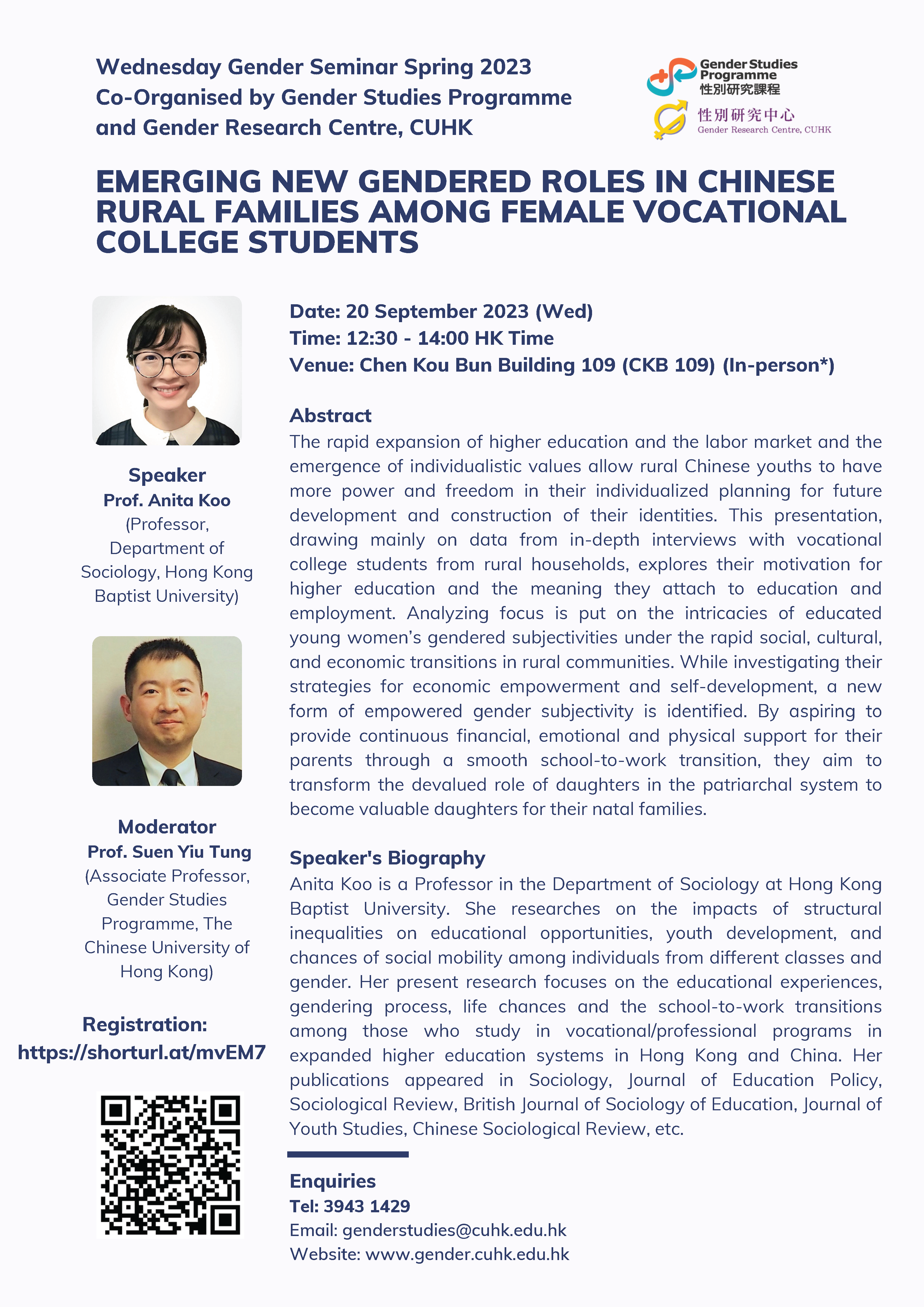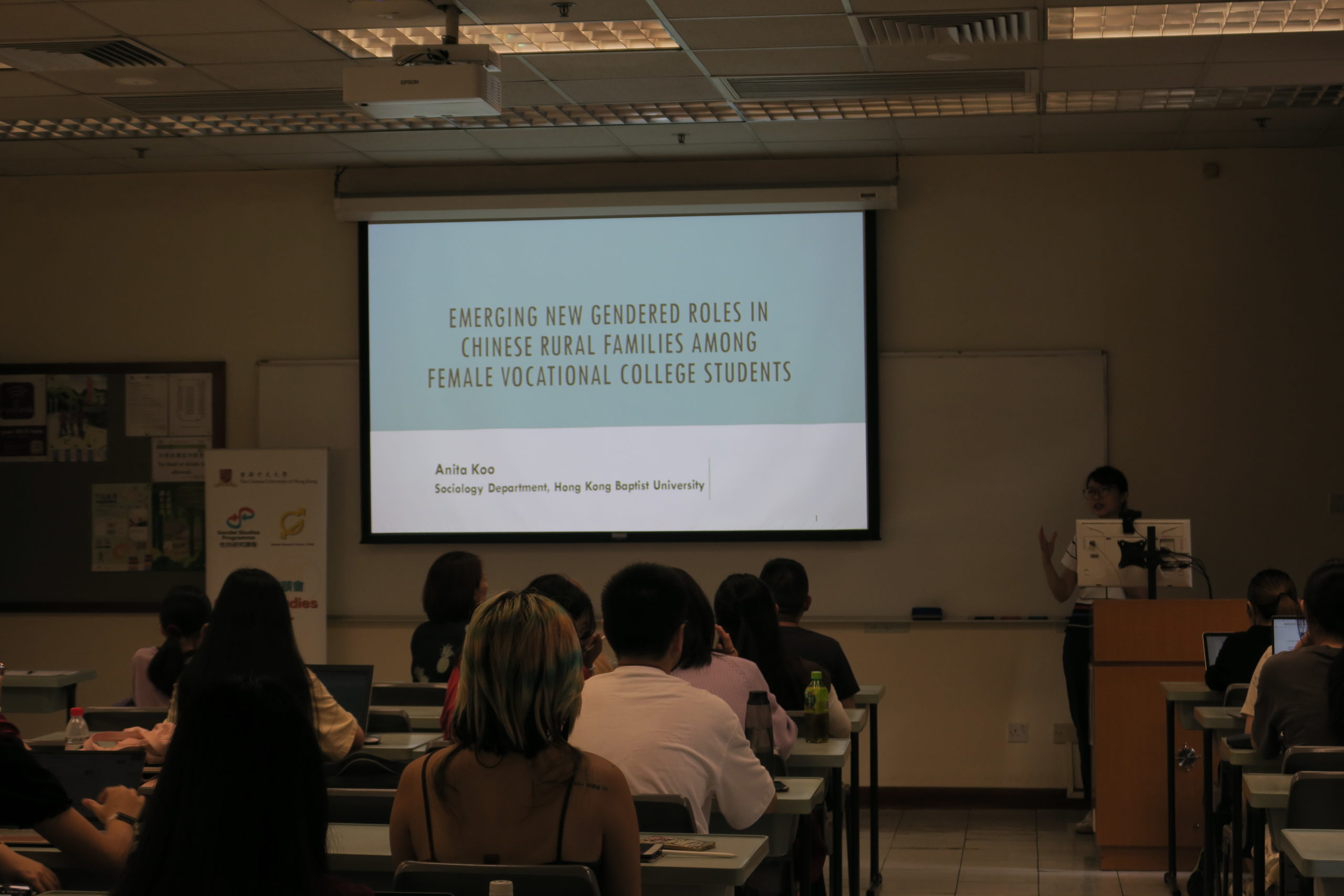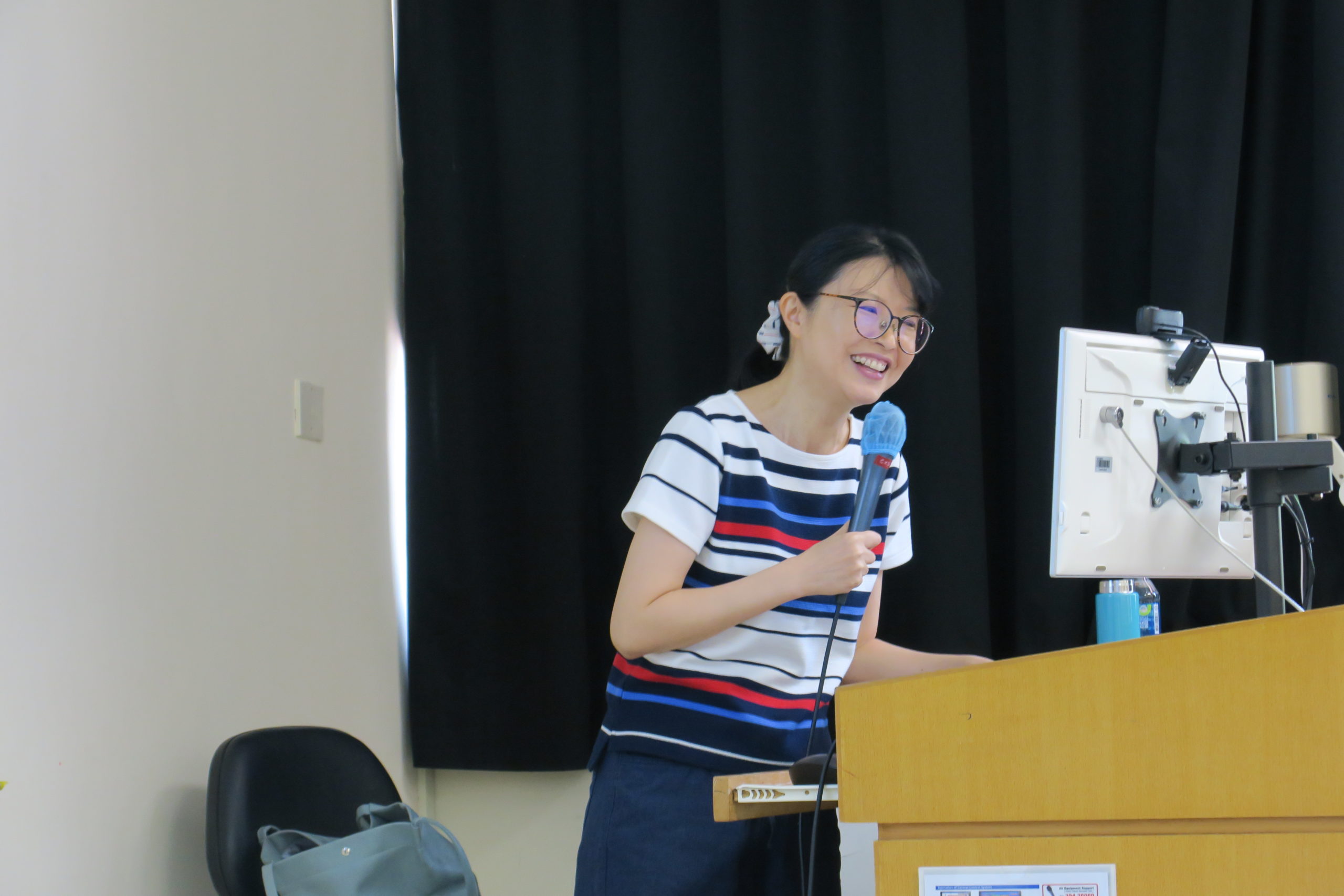This presentation focuses on the neglected field of vocational education in rural China, concentrating on the progression of women’s roles.
It begins with a background on vocational education in China. Vocational education is promoted in China to train skilled workers and foster development and high-paying jobs. Three main types of vocational school students were identified: children of rural migrant families, students with working-class backgrounds, and youth with other rural backgrounds.
The presentation featured two vocational colleges where most of the students come from rural areas and need loans to attend school. The marks scored by the students in the exams were too low, forcing them to choose vocational education. Professor Anita Koo found that there are inequalities in vocational education experiences. Men tended to study engineering, while most women studied programs such as nursing to enter the service industry. Both male and female students desired to gain better employment opportunities through education, whereas their educational choices were correlated with the needs of the gendered labor market.
Then Professor Anita koo interviewed the rural female students with questions about their educational decisions and life-planning. Rural women prioritize self-development and achievement through vocational education, and young women are beginning to aspire to financial independence and delay their marriage time. The female students believe that through this training they can counteract the traditional family system where rural women are seen as secondary and subordinate. They choose safe career paths as they consider practicality to be more valuable. Nevertheless, rural Chinese women’s desire for a caregiving role persists. This is closely related to the cultural context of rural communities in China, where their desire is to be valuable daughters. In appreciation of the support from their parents, they prefer to stay in their hometowns and become caretakers of their families. Men, on the other hand, take risks and become themselves to fight for the future.
In summary, the presentation brought about directions I had never thought about and exposed some issues. The advancement of women in education is an important transformation that enables them to obtain stable jobs in society and become independent women. These successful female students have economic autonomy, bringing new hope and influencing more female students. However, in the context of China’s rural culture, it is difficult for women to break out of the role of family contributors.
撰文:CAO, Jun
This lecture is titled as Emerging New Gendered Roles in Chinese Rural Families among Female Vocational College Students. Prof. Koo introduced the concept and influential factors of vocational education in China, pointing out analysis directions or questions with her research results after collecting lots of quantitative data.
First, Prof. Koo pointed out that vocational education is important but neglected. The rate of 40% students entering the vocational track represented the inequality of resources and opportunities, which was shown by the composition of students who were basically from rural or working-class backgrounds and got low grades in public examinations. With the development of industrialization and urbanization, expanding vocational education improved more opportunities to rural students, especially young women, but it seems that the regional and gender gap didn’t narrow in higher educational attainment.
Second, information concerning vocational college students were shown to discuss the impact of increased educational attainment on social values. Prof. Koo demonstrated cases from two vocational colleges in Bijie and Lanzhou region. By attending vocational colleges, students who failed to enter universities claimed subjectivities to achieve self-development, as Chinese youth had created new explanation of subjectivites. For rural female students, attending vocational colleges is regarded as personal intention for both individual success and convenience of natal family, concequently they have a strong sense to pursue economic independence instead of romantic relationships, but their achievements from realistic choices targeting “good major/courses” only for female still reflects gender stereotypes and segregation.
At last, Prof. Koo discussed how the vocational education forced social change by transforming the gender norms and how this training empowers female students. The key finding is that the new roles of young rural women is “valuable daughters” which is not acknowledged by the old patriarchal system. Their motivation of taking vocational education is trying to actively take responsibilities to prove ability or subjectivity by providing financial, emotional and physical contributions to natal family, which greatly enhances their sense of self-worth. However, this empowered agency may not challenge but strengthened the gendered structure of the labor market and the primary caregiving role of women in the family.
撰文:FONG, Yuk Ping
Prof. Anita Koo presented her research on the emerging new gendered roles in Chinese rural families among female vocational college students.
The rapid expansion of China’s higher education and labor market has led to the expansion of the important but neglected vocational education system, which provides young people who have failed public examinations the opportunity to realize their neoliberal dream. However, improvements in educational opportunities have not narrowed regional and gender gaps in higher education attainment, especially for female and rural students, gender segregation is more pronounced in poorer areas. These factors prompted Prof. Koo to focus her research on female students in vocational colleges who grew up in poor rural areas.
Prof. Koo conducted fieldwork in two vocational colleges in Bijie, Guizhou, and Lanzhou, Gansu, the poor provinces in western China. More than 80% of the students were from surrounding rural areas. Prof. Koo used in-depth interviews to explore the complexity of gender subjectivity among the new generation of educated rural female students.
The interviews revealed that these girls all emphasized the importance of economic independence. They resisted traditional patriarchal arrangements through education and employment, and planned to develop their careers before considering marriage. However, unlike career women, “reality” rather than inner passion, personal interest, or self-realization is the common decision-making attitude of these girls when making education and career choices, and “life stability” is more important than future development opportunities. What they consider a good major is defined by a highly gendered labor market. This is influenced by the social and cultural background of Chinese rural communities. Underneath their strong desire for economic independence and pragmatic choices about education and career lies their strong desire to become “valuable daughters” of their natal families. They hope to provide continuous financial, emotional, and material support to their parents through the three new roles of economic role, care taker, and supporter, thereby changing the devalued status of daughters in the patriarchal system. Gaining a sense of self-worth and meaning by actively assuming the family responsibilities and contributions traditionally expected only from sons is central to their gendered subjectivity.
Overall, although these female rural students know the importance of work for economic independence, they do not regard being a career woman as a measure of self-worth. Instead, they use their relational nature to measure their contributions. By shaping themselves into “valuable daughters”, they complete self-realization in the process of providing support to their natal families. However, Prof. Koo also pointed out that such an empowered agency does not necessarily challenge the gender structure of the labor market and women’s primary caregiving role in the family but instead reinforces gender segregation. Nevertheless, they think it is a massive change because they gain a new identity.
撰文:CHEN, Peiwei
This seminar focuses on female vocational school students ’ educational decisions and the life-planning and explores the factors that shape the goals and future roles of this new generation by doing fieldwork in Bijie, Guizhou and Lanzhou, in order to give a better understanding of the subjectivities of female rural students and to think about how can they exercise their agency and construct their own identities.
According to the situation of traditional rural women who married early, female students in vocational colleges think they are different from them. They resist the traditional arrangement- be married in their late teens and stay at home to take care of kids- and refuse to be subordinated in the partrilineal family system.
The importance of economic independence is their main concern. Those female students believe that girls need to have their own careers and if they are financially independent, they are better able to help their parents and have more confidence if they get married someday.
To increase one’s likelihood of being employed in the highly gendered labour market, the female students choose to be more realistic and will go for the major that are suitable for girls and the job that can provide a stable life, which reinforces the occupational gender segregation. They intentionally retreat from the skilled manual jobs. The education doesn’t bring significant change to the gender structure in the labour market.
Behind their hope for economic independence and pragmatic choice in education and occupation, they actually aspire to be valuable daughters for their original family. They take the role of economic resources to contribute to their parents, the role of close-distance care takers and the role of supporter for their younger (male) siblings to go further and achieve bigger.
The gendered subjectivities of female vocational students in rural area come from taking up the responsibilities and contributions to their family that were previously expected only for sons. They seem to have more agency, but it doesn’t challenge the gender structure in labour market and the primary role of women in the family.
撰文:DU, Qiongxuan
Vocational education in China has been overlooked both academically and in policy discussions, and students engaged in vocational education have been stigmatized as “failures” and marginalized in society. However, after 2000, China’s higher vocational education, in conjunction with national manufacturing policies, offered a new neoliberal dream for these marginalized students. How can we understand liberation and progress within this marginalized context? Professor Koo’s remarkable qualitative research on rural vocational college students portrays the challenges and choices of rural young men and women entering higher vocational education. Particularly, when male students’ employment aspirations are entangled with the national dream, female students’ choices become active, long-term, and highly strategic decisions. By enhancing feminized skills in college, female students choose to conform to the highly gendered labor market, at the same time they position themselves back into family (as valuable daughters, caregivers, and supporters, rather than career women) to construct their identity. Vocational education, however, didn’t change the gender structure in the labor market; it reinforced gender segregation.
Here, the based on assumption that higher education leads to liberation can be further discussed. It equates higher vocational education with higher education. However, vocational education in China, including higher vocational education and secondary vocational education, may not necessarily complement higher education; in fact, they can compete. The more university higher education develops, the fiercer the competition vocational college students face in the job market. Furthermore, as shown in the talk, higher education is expected to increase student mobility, whereas higher vocational education limits students to their hometown regions, turning them into local “technical workers.” The content of higher vocational education is also embedded in the patriarchal discourse prevalent in rural areas, serving market values. Instead of being liberal, it has the potential to further reinforce class segregation between urban and rural areas.
There’s also heterogeneity within vocational education. Secondary Vocational Education emerged simultaneously with compulsory education and has a history of over 70 years. It largely serves as a supplement to the nine-year compulsory education, often considered the “destiny” for rural and working-class families. On the other hand, Higher Vocational Education began to develop after 2000, with an emphasis on it post-2015. Students in Higher Vocational Education have already crossed the 50% high school dropout rate and possess higher levels of educational capital. They represent a privileged minority within vocational education, and this “privilege” is inseparable from their efforts and parental investments. Exploring the heterogeneity of vocational education can better help us understand the identity construction of rural vocational education students, especially their positioning within their family roles.
撰文:HUANG, Jiying





A
A
A
聯絡我們